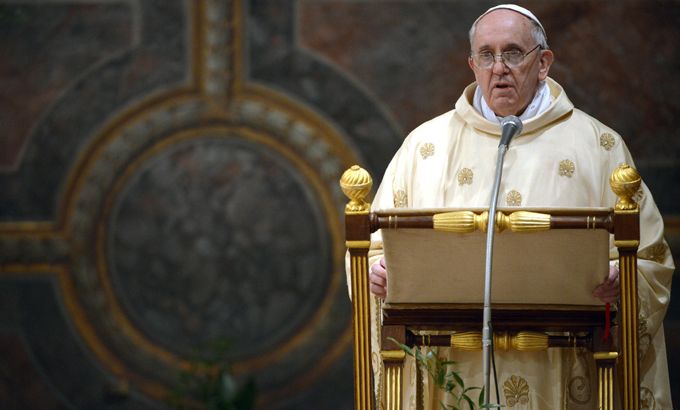Pope Francis embarks on historic papacy
Selection of Latin American to lead world’s Catholics is described as “geographic and cultural upheaval” for Vatican.

Pope Francis has embarked on a ground-breaking papacy as the first Latin American leader of the world’s 1.2 billion Catholics and a Church in turmoil.
Jorge Mario Bergoglio of Argentina, the humble son of a railwayman, kicked off his first full day as pontiff on Thursday with private prayers at a Rome basilica.
The election of the former archbishop of Buenos Aires, who had not been considered a favourite in the run-up to this week’s secret conclave, met with widespread surprise and expressions of hope for a groundswell of change for a Church dogged by scandal and internal conflict.
It was also seen as recognition of the Church’s rapid growth in Latin America, which is now home to 40 percent of the world’s Catholics, in contrast to its decline in Europe.
“The choice of Bergoglio shows that the Church is determined not to remain in mourning for the crisis in Europe but has opened its doors to the revitalising energy of Catholicism’s biggest continent,” Vatican expert Luigi Accatoli told the AFP news agency. “It is a momentous step.”
The Italian daily La Repubblica, under the headline “Revolution at St Peter’s”, said the election of the former Jesuit priest represented a “geographic and cultural upheaval” for the Vatican.
‘Pray for me’
Francis was elected on Wednesday on the second day of the conclave in Vatican City, after receiving the required two-thirds majority, or at least 77 votes of the 115 cardinal electors from 48 countries.
The 76-year-old from Buenos Aires is the first Jesuit and the first non-European pontiff in nearly 1,300 years.
The Jesuit order, which was founded in the 16th century, has a strong educational focus and takes vows of poverty, chastity and obedience to Christ and the pope.
|
Al Jazeera’s Lucia Newman reports from Argentina |
Pope Francis appeared on the central balcony of St Peter’s Basilica just over an hour after white smoke poured from a chimney on the roof of the Sistine Chapel to signal his election.
“Pray for me,” the new pontiff, dressed in the white robes of a pope for the first time, urged the crowd.
The news of announcement was met with cheers from hundreds of thousands of crowd gathered under the rain at St Peter’s Square in Rome.
Cardinal Jean-Louis Tauran, the protodeacon, made the announcement with the Latin words, Habemus papam, meaning “We have a pope”.
Inaugural mass
Francis succeeds Benedict XVI, who stepped down on February 28, the first pontiff to do so in 598 years.
As a sign of the election of a new pope, the Vatican also reactivated the Twitter account @Pontifex.
Francis spoke by phone with Benedict XVI after his election and plans to see him in the coming days, the Vatican said.
Jubilant Argentines poured into churches, some crying and praying, after the announcement at the Vatican.
“This is a blessing for Argentina,” one woman shouted on a Buenos Aires street.
“I hope he changes all the luxury that exists in the Vatican, that he steers the church in a more humble direction, something closer to the gospel,” Jorge Andres Lobato, a 73-year-old retired state prosecutor, said.
Al Jazeera’s Teresa Bo, reporting from Buenos Aires, described the reaction in the Argentinian capital as “absolute shock”.
“Nobody expected him to become pope,” our correspondent said. “People here are crying”.
Challenges ahead
Father Robert Gahl of Holy Cross University told Al Jazeera that the name Francis was “indicative of something historical”.
Gahl described as “striking” the reaction to the new pope, which he said was “way superior to what occured eight years ago, which may be a surprise to some”.
With the election of the new pope, Vatican now faces several key challenges.
“Much was made about whether the new pope would be one who focused on pastoral care – speaking to the faithful around the world or would he be one who tries to reform the Vatican,” Jack Valero, director of the Catholic Voices organisation, told Al Jazeera.
“In reality, he needs to do both.”